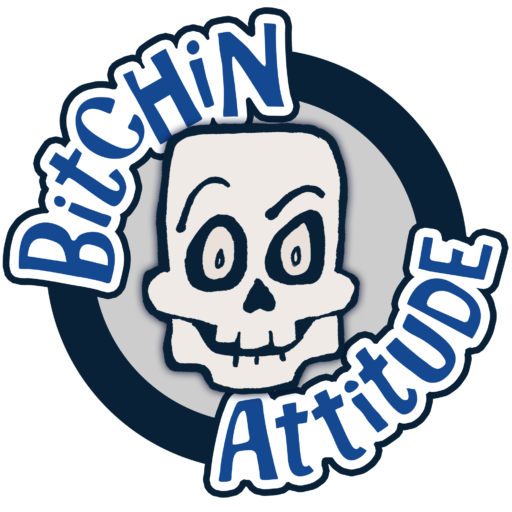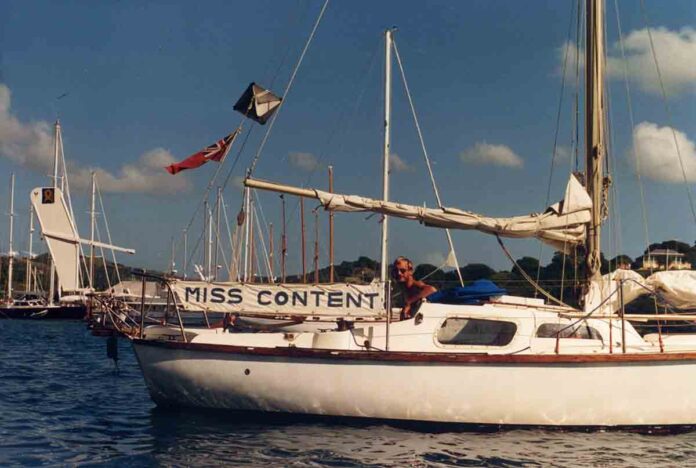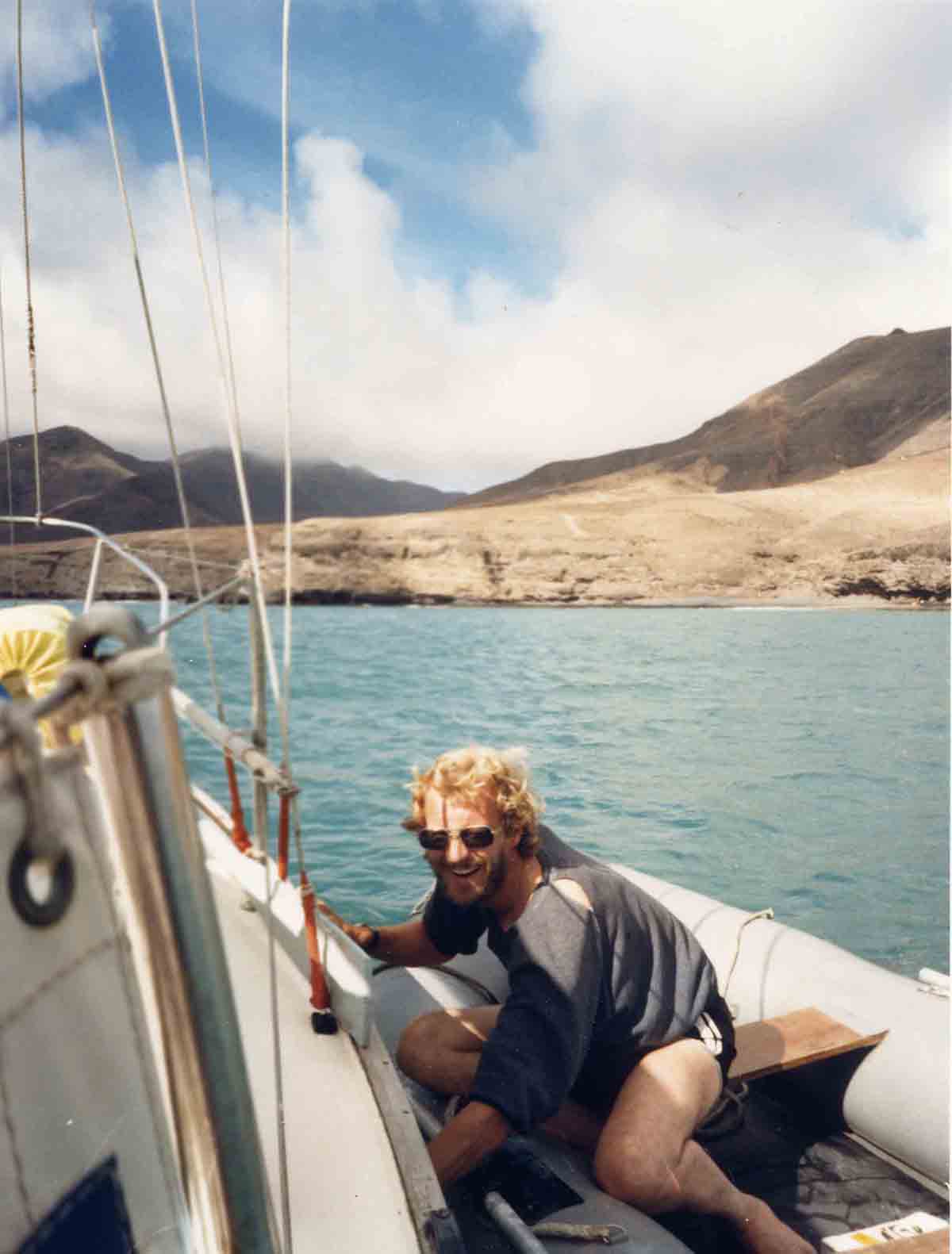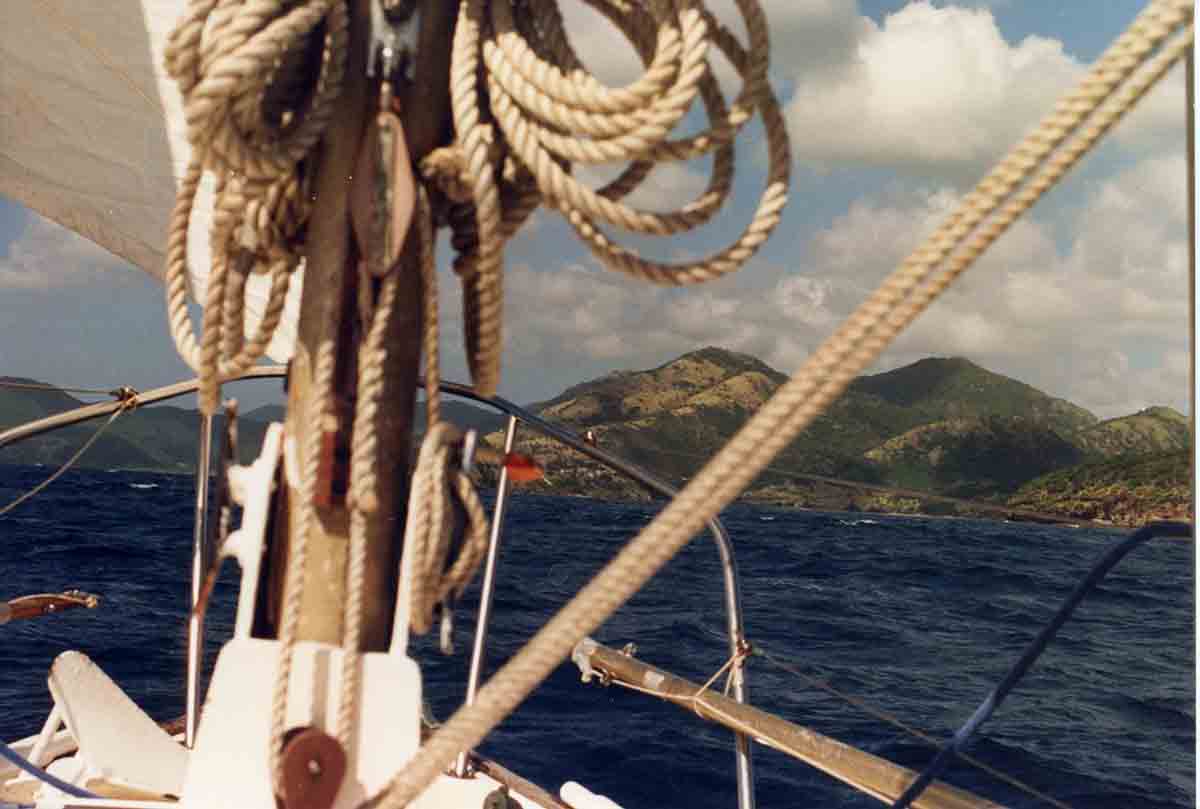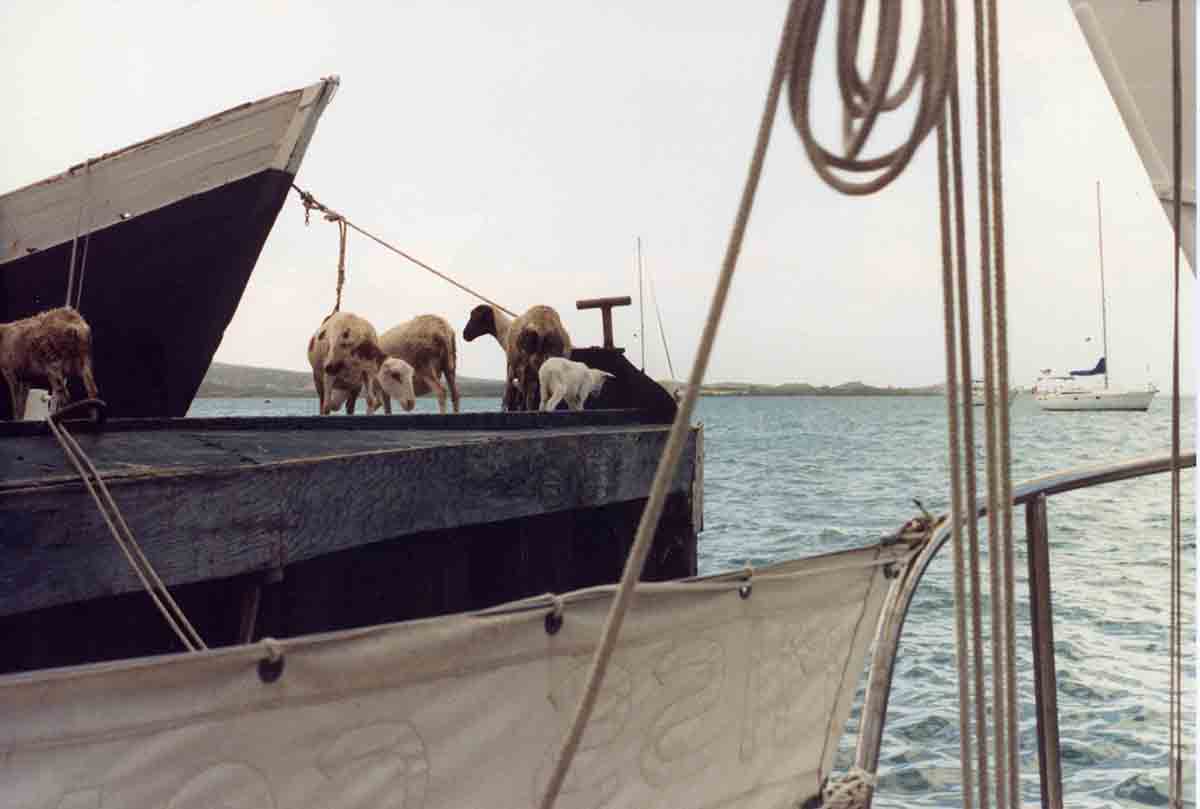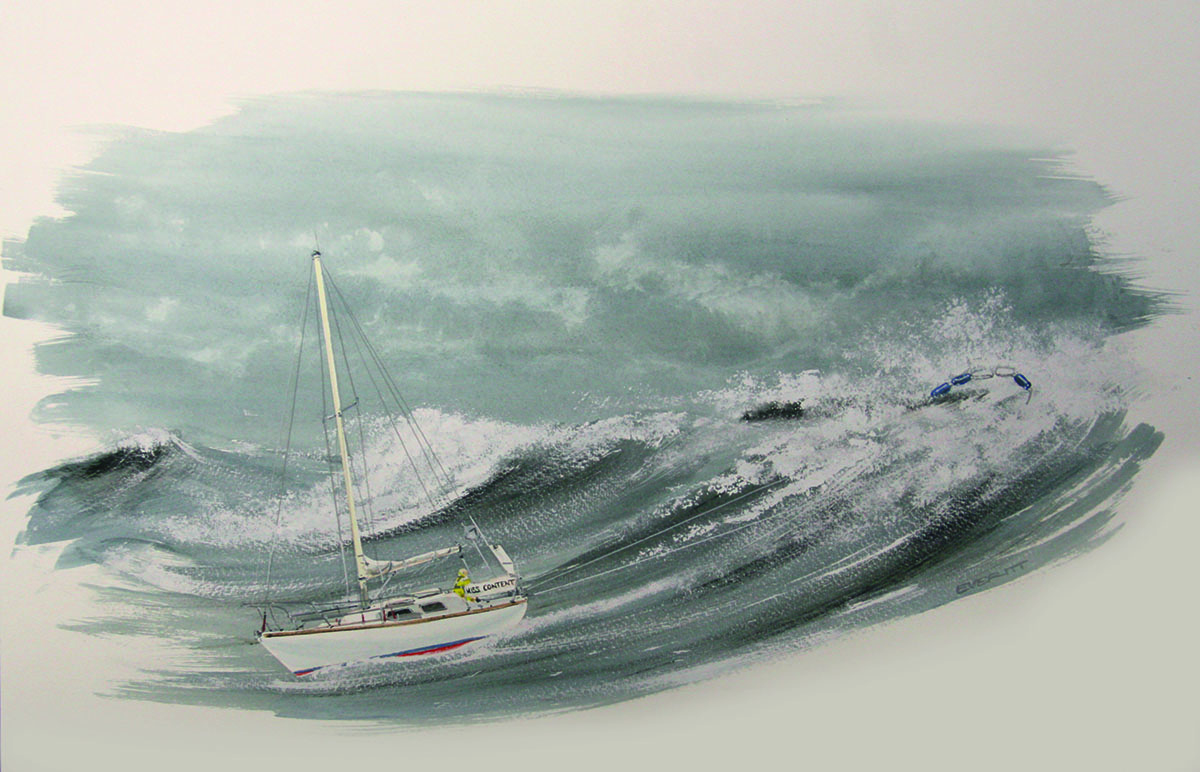A Simpson sea shanty after first single-handed crossing (With my profuse apologies to all those old seadogs that can write poetry).
28 days was no disgrace when bound for Antigua,
with my little toy,
Roll away,
Let those twins draw,
And those lines might find a bite,
Roll away,
They’ll be a Mermaid swimming,
round my tiny boat,
Roll away,
With multiple tubes of cold Red Stripe,
And the Antiguan Air Force waiting for me (see N.B. after article)
Run will be away.
Personally, I love old seadogs terms for different conditions under sail on ocean passages. The Variables winds North or South roughly N or S 40-30th latitude were called the ‘Horse Latitudes’. Because it might take a while to get into the Trades and the livestock onboard were dying. Or ‘the Roaring forties’ those stormy winds that blow RTW unchecked in the Southern Ocean, the screaming sixties easterlies further south or north; or the big heat and sudden squalls of the ‘Doldrums’ 5 degrees either side of the equator.
These terms are all very dated nowadays, and other countries sailors have their own excellent vernacular from those old square-rigger’s days. As a Brit., I don’t know that many of ‘em. Even though I’ve raced both with and against many foreign sailors. This idea is not about that but about having some fun when you’re young with a small boat.
On my first single-handed crossing, I used the ‘Christmas Winds’ i.e., the ‘NE Trades’ which usually guaranteed you might reach the Caribbean before Christmas. Supposedly this was when these trades were most reliable, which was proved to me on my next crossing three years later.
The other term for this passage is the ‘Ladies Route’ which is perhaps not quite PC nowadays. But this route suited me and this tiny yacht.
Whatever, I left Puerto Rico in Grand Canaria on the 18th of December 1983. Knowing that I would be spending Christmas and New Year alone on my 22-foot boat. It took me 28 days to cross to English Harbour, Antigua. I was not a stranger to crossing an ocean, but this was the first time by myself (Am very sorry will try not to include too many Murry Walker-isums!).
It’s easy to write about now many years later, but it doesn’t explain the nervousness’ about this venture. Possibly because we’d had quite a rough ride sailing south from Plymouth to Lanzarote after leaving in late October. Being hammered by several gales and mostly foul wind on a 29-day passage. It was a wonderful joy just to reach some sunshine and much warmer weather in the Canaries.
My crossing was excellent, apart from fixing very few failures or my mistakes. Light winds to reach the trades. Then a glimpse of the Cape Verde islands, and we’d found them. Then we had many lovely sunny days, steady east to NE winds between F3-5 with quite coolish nights but steadily rolled along.
Only a few minor maintenance problems occurred; each day produced about an inch of progress on my small-scale Ocean chart. Christmas Day was a fine celebration with a good red wine. After seeing those little Scud clouds which meant I’d found the Trades on the Eve…
My Astro skills weren’t that great, only being able to do sun-run-sun plotting. Just Sun sights because the Stars, planets and Moon were still a total mystery to me back then.
Minor problems were very simple: a cockpit hard eye pulled out where I’d fixed a turning block for my Hasler self-steering. Easily re-fixed using some plywood back up. The Paraffin ‘Taylors Ideal’ twin cooker had a few re-builds with burnt-out rings, but cooking with gas (storage weight) wasn’t an option with the time I spent at sea for each passage. My 12-volt system needed some re-wiring probably due to the wet, hard passage from Plymouth.
Once I slipped on the foredeck, probably due to overconfidence whilst changing down to a smaller poled out jib twin without being clipped on. Luckily managing to grab the lee stanchion wires. Thereafter, even if nude, I made certain to put my harness on and clip on. Then finally we nearly hit Antigua when I fell asleep before this landfall. Coming rather closer to Shirley Lighthouse than was necessary.
But I found out that I could deal with being on my own quite well, provided I gave rent to any anxiety, frustration, or fear by going in the cockpit and then swearing at any unexpected goffers, leaks or other tiny problems. Whilst also praising my tiny craft for keeping me afloat.
Stupidly becoming slightly mad at a good F7 when we were getting closer, which was probably a small tropical wave. Having a change to headwinds for a few hours, a couple of hundred miles short of my goal. With some Cockpit fillers and short foul wind meant only I’d got far to laid back. By now far too comfy doing just a hundred nm. or slightly more each day. This type of cruising wasn’t like racing.
Enjoying eating fine food and looking at the ocean and the amazing wildlife. I’d come to terms with myself and this existence. Single-handed sailing, I realize, doesn’t suit everyone, even though they can be quite brilliant sailors. You must be slightly fatalistic, optimistic, and enjoy a simple life. Sailing in the ocean with all its entirety. Although it’s mostly blues and greys, it’s very full of well-adapted wildlife, occasionally good fishing, magnificent sun, and stars. And it allows you to contemplate. To know that we’re a very small part of our globe and huge universe. I forgot the lady of my life of the past seven years and realised I can do this…
You can smell the land before you even step on it. Though I arrived in English Harbour and dropped the hook in Freeman’s Bay about four thirty am. It was still dark and, for me, a new place. I’d taken a good trace of this entrance from other sailors in Las Palmas. It felt rather strange at anchor after the constantly rocking around at sea with a big lack of wind noise, but I felt quite content.
Sometime later that morning, a lovely American lady in bikini swam round my boat whilst I was still not with it. Having just woken up. Then she asked me why I had a yellow rubber duck tied astern, which had sunk. Which is another yarn; I felt she looked rather like a greeting mermaid. Which was wonderful after a rather nasty, noisy visit by the local customs about dawn.
Another UK small boat single-hander called Robin lent me some E.C. dollars. Then started to ask me particularly about how much sleep I’d had every 24 hours. It was his second time around on this passage. He mentioned that he got his head down for between 8 and 10 hours each night. Whereas I’d slept early after supper, then woke up about four a.m. each day to see the sunrise. Having much more broken periods of sleep. Did I use my Tri-colour Nav. light all night? Well, no, but I kept it on when asleep, which he thought was a waste of time and energy. But every first is a big learning curve…
I blew up my tiny flubber and rowed ashore, collected my mail from Nicholson’s after finding I was a bit wobbly at first. Watched some hummingbirds, other wildlife, and local people. Then I had a very long shower, not realising I was very salty. It felt very hot ashore, and thank goodness the shower wasn’t heated.
Spending the next 48 hours meeting many people, having a few bevies and certainly boring some pals that I knew their: with loads of my verbale rubbish…
At the end, we are all sophisticated apes and need human company. Maybe I’m wrong (very often! ), but I feel you need to be reasonably young to have any kind of small adventure. Because then you can adapt, take it easily into your stride, and have great fun…
N.B. The Antiguan air force was so named by some wag about the lovely Pelican’s that dive in English Harbour.
